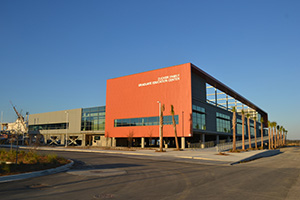Clemson U Adopts Energy Storage System to Reduce Costs

Clemson U's Zucker Family Graduate Eduation Center
Clemson University has deployed a distributed energy storage system in an effort to reduce energy costs and to provide engineering students an opportunity to practice measuring and tracking energy savings.
The university adopted the L2000 Distributed Energy Storage System from Johnson Controls for use in its Zucker Family Graduate Education Center. The 160-kilowatt hour system comprises both batteries and inverter and is capable of delivering 50 kilowatts of power. Predictive control software automates battery usage and simplifies monitoring and integration with the existing Metasys Building Automation System allows for control of the storage system and the large energy consumption loads of the site.
The university will also use the system in the education of students.
"Clemson University looks forward to the next phase in energy storage research and testing with faculty and students by partnering with Johnson Controls which understands the importance of student engagement as a key success factor for a ready workforce," said Johan Enslin, Duke Energy Endowed Chair, Smart Grid Technology and executive director Energy Systems Program-Charleston, in a prepared statement. "The need for advance energy services, resilient grid infrastructure, cyber physical security concerns and the increasing cost of energy are driving innovation in energy storage technology."
"Our distributed energy storage system is a natural extension of our core businesses in the buildings and battery markets and partnering with Clemson University allows us to help deliver the kind of smart and integrated energy management that will keep students and faculty comfortable while driving down utility costs," said John Schaaf, vice president of distributed energy storage at Johnson Controls, in a prepared statement.
The move builds on an existing partnership between Clemson and the company, including the adoption of the Metasys system, collaboration at the university's energy innovation center and a project in which students and company scientists are studying the effects of battery aging on the fuel economy of some hybrid vehicles.
About the Author
Joshua Bolkan is contributing editor for Campus Technology, THE Journal and STEAM Universe. He can be reached at [email protected].